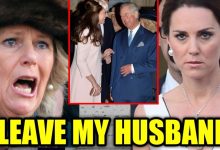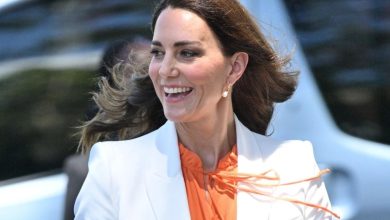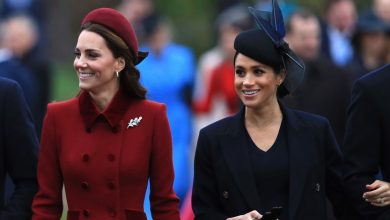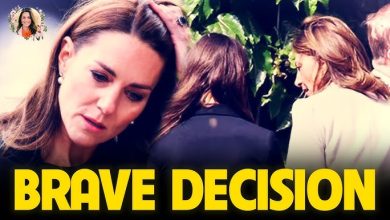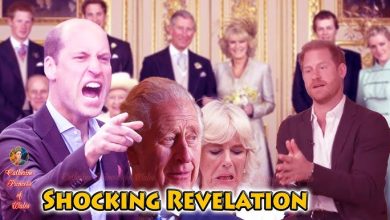Welcome back to our website, where we share updates and untold stories about Katherine, Princess of Wales, and her royal family.
Today, we bring you some news: King Charles’s final statement moved William into shock and marked Katherine’s return.
King Charles made a concluding declaration to Prince William. This unprecedented action signifies Princess Katherine’s comeback. According to insider information, King Charles has sent a last message to Prince William, which is a momentous and unique action. This marks a crucial point in the Royal household’s commitment to tradition and the responsibilities of successors.

Confidential information indicates that King Charles’s health issues and Princess Katherine’s cancer treatment, which have caused anxiety since the start of 2024, have influenced this decision, along with urgent challenges within the monarchy. Princess Anne, a prominent counselor to the king, played a pivotal role in influencing this choice, which has caused Prince William to struggle with the intricate balance between his love for his family and his responsibilities as the next in line to the throne.
King Charles’s medical conditions, which have been concerns since the beginning of the year, have increased the importance of his choices for the monarchy’s foreseeable future. These health concerns, together with the need to preserve stability within the Royal household, have resulted in a sequence of choices that deviate from customary practices yet are considered essential for the welfare of the monarchy.
Discuss the problems faced by Prince William and Prince George. Prince William’s family denies helicopter transportation—an unsettling choice.
King Charles took a momentous decision to forbid Prince William from utilizing helicopters to carry his whole family. This decision follows a series of disagreements between the king and his son over the safety and potential hazards of such journeys. In his book, *Catherine, the Princess of Wales: A Biography of the Future Queen*, royal scholar Robert Jobson points out the debate between King Charles and William on the safety of flying William’s family, especially Prince George, who will become second in line to the throne. According to Jobson, a current point of contention is William’s persistent refusal to heed his father’s counsel regarding ensuring the continuation of the monarchy.

Jobson clarifies that although Prince William is an excellent helicopter pilot, his determination to personally fly his entire family has caused disagreement. Last year, the king expressed his worries to his son, but William did not respond positively to these concerns. As a result, King Charles took a drastic step by demanding that William sign an official document recognizing the hazards associated with his activities and assuming full responsibility for them.
Popular endorsement of King Charles’s determination:
The people have overwhelmingly endorsed King Charles’s decision to curtail Prince William’s utilization of helicopters for familial transportation. Numerous individuals have expressed concern about the security of the royal household and the importance of protecting the succession order. Furthermore, specialists have provided their input, concurring that the king’s choice is a sensible and cautious one. Despite the absence of any royal household members on board, memories of the 1967 catastrophe that resulted in the death of the Queen’s flight haunt the royal household. Queen Elizabeth II, before her passing, had voiced her apprehensions over William taking charge of his family’s flying duties. This feeling forced King Charles to take action.
Prince George’s future involves attending a boarding school and receiving a royal education, another notable feature of King Charles’s concluding address. Prince George, who will turn 12 years old next year, will enroll in a boarding school, an educational trajectory for future monarchs. This decision includes Princess Charlotte and Prince Louis, who will receive specialized education to prepare them for their future roles as active members of the royal family. Public information supports the decision, as many recognize the importance of a well-organized and rigorous education for the future monarch. The long-standing custom of sending royal children to boarding institutions aims to ensure they receive the best possible education and equip them with the necessary skills for their upcoming responsibilities.

Ambivalent occasion for Prince William:
According to a close friend of the Wales family, Prince William has had mixed emotions over his choices. Although he understands the importance of these steps in ensuring the monarchy’s security, the psychological strain of being unable to travel with his entire family in the same mode of transportation has been significant. Public remarks and professional opinions demonstrate a combination of empathy and understanding towards Prince William’s situation. The position of an heir entails significant obligations, and these choices highlight the sacrifices that follow. Maintaining the security of the monarchy, King Charles is determined to enforce these norms to guarantee the monarchy’s security and uninterrupted existence.
According to sources, Prince William’s official agreement underscored the seriousness of the king’s concerns and the importance of safeguarding the lineage. As Prince George nears the age of 12, the enforcement of these regulations becomes more crucial. Prince William and King Charles disagreed about the use of helicopters for an extended period of time. The dispute between King Charles and Prince William on the utilization of helicopters for familial transportation has intensified, exposing an intricate interplay between customary practices, security measures, and the contemporary lifestyle of the members of the royal family.
Prince William, a skilled helicopter aviator who successfully finished a search and rescue training program at Royal Air Force Valley in Anglesey, Wales, in 2010, has always maintained assurance in his capacity to securely carry his entire family. Nevertheless, King Charles’s worries are based on previous events and the possible hazards to the line of inheritance. There are issues related to the past and conflicts within the family. The late Queen Elizabeth’s personal concerns over helicopter travel have strongly influenced King Charles’s position. This unfortunate event serves as a poignant reminder of the inherent risks involved with air transportation.

Queen Elizabeth II had already conveyed her disdain for William leading his family—a stance that King Charles has now implemented more rigorously. According to Jobson’s new book, William angered the deceased Queen by disregarding her wish for him not to fly with his loved ones the distance of 115 miles from Kensington Palace to Ammer Hall, the place they lived in Norfolk. The historical backdrop provides a deeper understanding of the contemporary debate, emphasizing the continuous struggle between individual liberty and the obligations of monarchy.
William’s point of view:
Prince William’s significant training and expertise as a helicopter pilot give him the confidence to safely carry his entire family. He ignores his father’s advice because he believes in his own abilities and wants to maintain a sense of normality and independence in his family life. The conflict between the viewpoints of the father and son highlights the wider difficulties that contemporary royals have when trying to reconcile their personal wishes with their public duties.
The public’s response to this disagreement has been varied but usually favorable towards King Charles’s choice. A significant number of individuals comprehend the significance of protecting the order of succession and reducing potential hazards to the royal household. The public remarks demonstrate a practical and realistic approach, as well as an acknowledgment of the distinct duties associated with being the successor to the throne. Furthermore, specialists have provided their insights, highlighting the wisdom of King Charles’s choice. Dr. Jane Thompson, a royal historian, emphasized the utmost importance of ensuring the safety of the royal family members and the potential dangers of helicopter travel. Although Prince William’s piloting abilities are indisputable, the potential ramifications of an accident involving several successors are too substantial to disregard.

Prince William’s psychological impact:
We should not underestimate the impact of this choice on Prince William’s emotions. The realization that he is no longer able to accompany his loved ones in exactly the same mode of transportation has caused him feelings of sorrow and annoyance. The imposition of this limitation, while essential for the preservation of the monarchy’s stability, has engendered a complicated and conflicting situation for William. He must carefully negotiate the complexities of fulfilling his responsibilities as both a parent and an heir. The advent of a new era brings out a fresh set of royal obligations.
As Prince George nears the age of 12, the enforcement of these regulations becomes more crucial. We will closely and rigorously supervise the upcoming monarch’s schooling and instruction to ensure he acquires the necessary information and skills to fulfill the obligations of the monarchy. Ultimately, the dispute between King Charles and Prince William on helicopter use underscores the changing nature of royal duties and the intricate equilibrium between customary practices and contemporary approaches.
King Charles’s choices demonstrate a commitment to maintaining the security and continuation of the monarchy, as evidenced by the people’s and experts’ endorsement. While Prince William faces this difficult time, the sacrifices made during the pursuit of duty constitute a powerful reminder of the intricate nature of royal life.

